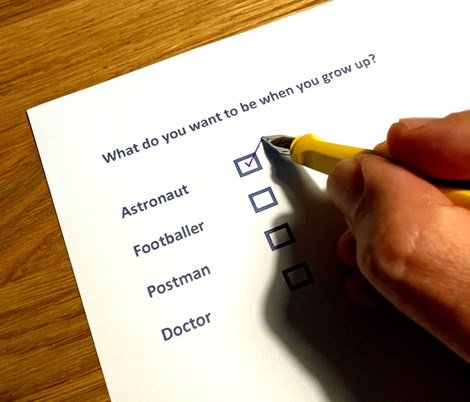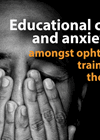“Please phone Mr C Lyon ASAP on 0131 334 9171”
This was a message from my secretary waiting for me on my computer one morning shortly after I was appointed a consultant. The name did not ring any bells but whatever it was it seemed urgent. At lunchtime that day, the first time I had the chance, I dutifully dialled the phone number.
“Thank you for calling the Royal Zoological Society of Scotland, Edinburgh Zoo…” was the recorded answer. The wheels turned slowly in my head. C. Lyon…Zoo…Sea Lion. Oh, ha ha very good. I had been well and truly got by my secretary, but it made me laugh and brightened my day.
This moment, along with many others over my career, serves to remind me that one of the most important aspects of any job is to have a good set of colleagues, especially those with a sense of humour. On asking a colleague “Can I use your Dictaphone?”, to then be told “Just use your finger like everyone else!” makes the day much easier to endure when a good measure of laughter is thrown into the mix. I cannot emphasise enough how essential this is for a career in medicine, which by its very nature carries significant pressures and stresses.
I did not always want to be a doctor. In the late 1970s, when I was around seven-years-old, our primary school class was given the task of completing a survey on what job we would most like to do when we were grown-ups. The list had a limited number of choices, and the occupations on the boys’ list, from those that I can remember, included footballer, astronaut, doctor, and postman. I never knew that choosing a career could be so easy! Given that Star Wars: Episode IV - A New Hope had just been released in the cinemas, and the lightsaber-wielding Luke Skywalker was nearly every schoolboy’s idol at the time, I chose astronaut. But it was a close-run thing, as a slightly more realistic option for both having fun and basking in glory like the other icons of that era, such as Kenny Dalglish and Kevin Keegan, was footballer.

Unfortunately, astronaut was never going to happen given the extremely limited career opportunities, and even now I am never going to be able to afford a ride on Richard Branson’s Virgin Galactic commercial spaceflight unless I win the lottery. The runner-up occupation of footballer was also a pipe dream given my skills never progressed beyond the “three and in” jumpers for goalposts kickabout in the local park. Retrospectively, postman would probably have been the best choice from those available, as my local postman is the happiest person I know, always cheerful with a smile on his face.
However, at the start of my final year of school in autumn 1988, around the time Yazz and the Plastic Population were filling everyone with positivity with their chart-topping song “The Only Way Is Up”, I optimistically chose doctor. As mentioned in the article “Money Never Sleeps”, I had been contemplating several other careers in the latter years of High School which included a “Greed is Good” Gordon Gekko-type occupation, and investigative journalist, which still remain a couple of the dreams that I did not follow. Anecdotally, from speaking to many medical friends and colleagues, I am not alone in not following my dreams. A considerable amount of soul searching, in combination with the added ingredient of parental persuasion, resulted in me writing A100 (medicine) on my university application form.
In the movie What’s Eating Gilbert Grape (1993), Gilbert (Johnny Depp) is a grocery clerk in a small Midwestern town who has problems eating away at his life which include a feeling of being trapped by his environment, in particular because of his responsibilities for looking after both his morbidly obese mother and his mentally disabled younger brother (Leonardo DiCaprio). In a similar fashion to Gilbert, I have underlying issues eating away at me with regards to a career in medicine. Whilst my decision to pursue medicine has provided me with many positives, it is these issues which make it a challenging career in the long term and which I will go on to discuss over a series of articles.
For the primary issue I have with medicine, it is necessary to start at the very beginning of what a medical student is taught at the start of the clinical years of a medical degree, and that is how to take a history from a patient. And the first part of this history is…The Presenting Complaint. Er…hello? Let’s just stop and think about that word “complaint”. The dictionary definition of complaint is “an expression of grief, pain or dissatisfaction”. It is a word that does not really conjure up any positive thoughts. Whilst it is understood that any job in a service industry which involves dealing with the public will result in a complaint at some point, almost every consultation with a patient begins with a complaint about illness and a symptom which is troubling them.
“But”, I hear you say, “that is what you signed up for! A job involving treating disease and making people better.” That is very true. And I am sure at the medical school interview, when asked the question “Why do you want to study medicine?”, I used the dreadfully cliched answer, “To help people,” in response. Furthermore, the actual studying of medicine and how the human body can be affected by disease and how illness can be managed is truly fascinating. However, it is the actual practising of medicine where the problem lies.
Continually dealing with these complaints which underlie almost every doctor / patient interaction, each one of which carries a negative emotional charge, all day every day, for the duration of a medical career unfortunately can take a mental toll over time. Doctors are at a much higher risk of depression, and it is these constant negative interactions which I believe is one of the many contributory reasons. A significant degree of resilience is required to cope, but even this can be whittled down over time resulting in burnout [1].
“But”, again you may say, “what about those patients you cure, surely that is rewarding?” The problem in medicine is that although many patients are indeed cured, much of the work entails dealing with chronic illness, trying to manage symptoms, and attempting to slow any decline. Unfortunately, those that are cured, you invariably never see again and therefore do not get to enjoy the reward of their gratitude. For my own part, the majority of the patients in my ophthalmology clinics have chronic eye diseases which are slowly progressive, and my job is to try and slow down this progression. At the start of every consultation, I will ask the patient how they are getting on with their vision and I will usually get the response: “a little bit worse”. Sometimes, I do feel like a mole from the whack-a-mole game, being bashed continually over the head with the mallet of negativity.
This therefore brings me full circle to what I mentioned at the start of this article which is to try and fill your day with as much humour and laughter as you can to weather the storm of medicine and the stresses that it brings and provide some degree of resilience to prevent burnout. The darker the humour the better. One consultant I had the pleasure of working with achieved this on a regular basis. During one operation under local anaesthetic where the patient seemed a bit restless, he said to them under the drape: “How are you doing down there? Still alive? Good show, can’t have you dying on us. If you wait until you’re out of the building and at the bus stop it will save us a lot of paperwork.” And for goodness sake, on April Fool's Day, if there is a set of patient notes in the clinic pile which says “Hugh Jarse”, don’t call out the patient’s name to the waiting room.
As this article draws to a close, the midnight hour appears to be close at hand. And taking liberties with the lyrics from Michael Jackson’s “Thriller”:
“Under the moonlight you see a sight that almost stops your heart. You try to scream, but terror takes the sound before you make it. You start to freeze as horror looks you right between the eyes. You’re paralyzed. ‘Cause this is GMC, GMC night.”
Be afraid. Be very afraid. Because the next instalment covers another important issue I have with a career in medicine: The GMC. Muahahahaha!
References
1. Imo U. Burnout and psychiatric morbidity among doctors in the UK: a systematic literature review of prevalence and associated factors. BJPsych Bull 2017;41(4):197-204.
[This article describes the increased risks doctors have of mental illness. To counter this there is a quote by the motivational speaker Dr Madan Kataria which is very relevant: “I have not seen anyone dying of laughter, but I know millions who are dying because they are not laughing.”]
COMMENTS ARE WELCOME










